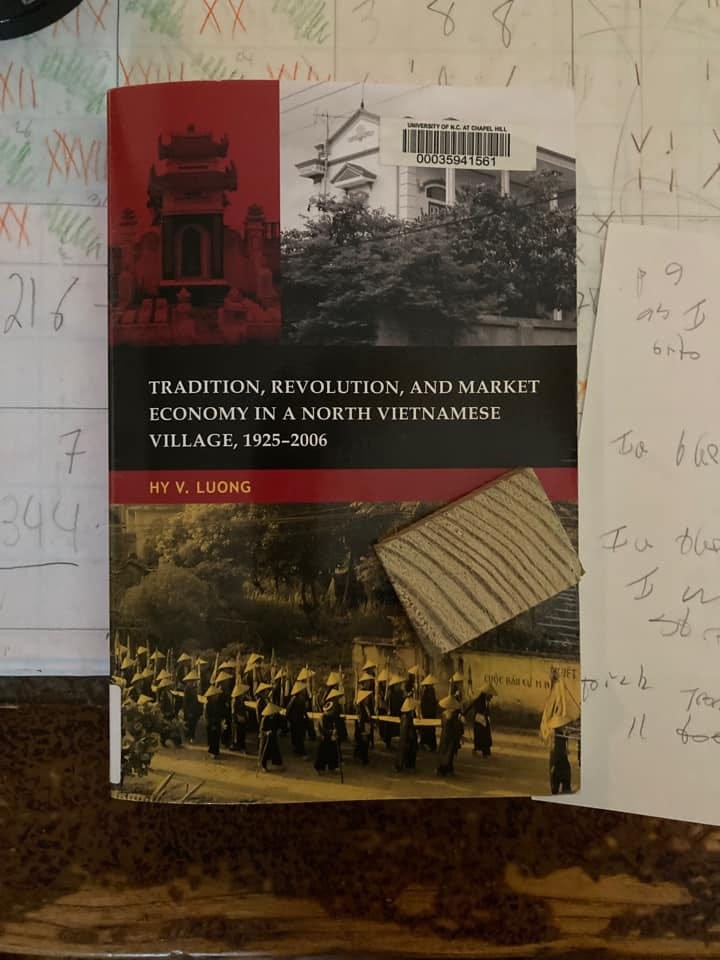Tradition, Revolution, and Market Economy in a North Vietnamese Village, 1925-2006 (i)
from anthropologist Hy Van Luong and Vietnamese studies
"Although I had visited the village earlier in the summer [of 1987] as a fictive kinsman of Nguyen Duc Bang, a relation structured by the use of kin terms common among unrelated Vietnamese..."
The author Hy V. Luong had published his first book on this very use of terms of personal reference by Vietnamese refugees in California to relate to one another as family.
I know him in person as the anthropologist Hy Van Luong. That “Van” the author has swapped in a “V.” for means literature in the sense of texts one uses to cultivate the self for government through first ordering the family and the community.
I could tease that V. evokes for me instead V.I. Lenin as indeed the book relies on an internationalist sense of capital and resistance. If I did that I would call him Hy, which come to think of it is funny, sounding as English "he."
Hy, Bud Abbot might say, is on first. Lou Costello would reply, who? Hy!
"Although I had visited the village earlier in the summer [of 1987] as a fictive kinsman of Nguyen Duc Bang, a relation structured by the use of kin terms common among unrelated Vietnamese, with the [new] formal introduction I was able to gain access to a wider network of villagers, including the Party leaders."
Hy started out where he lives in Canada with the written memoirs of Bang, a villager in exile. Hy traveled to the village in Viet Nam as fictive kin to Bang's contacts there. He subsequently returned with permission to research more widely than his friendship with an author had won.
"The duration of my field research in 1987 was limited by national security officials and well as by the common practice among Vietnamese ethnologists and sociologists of spending no more than six weeks in any particular community at one time."
Note that Hy conducted his research not only under the authority of Vietnamese officials but also within the norms of ethnographers from their own capital who also work in the field.
"In the summer of 1998, I revisited Son-Duong in order to donate the royalties from the publication of my book Revolution in the Village to a worthy local cause and to learn what changes had taken place in the village over a decade of market-oriented reforms in Vietnam."
Again, exemplary behavior. Hy followed through on the village's support to publish a book then returned to give his share of its proceeds to a project of the community.
Royalties, there is another fun word. Sovereigns. In Vietnamese we say that the emperor's rule stops at the village gate.
The people of the town had opened their gate to Hy under the rule of the Ho dynasty and here he came back with cash earned in dollars. Fun because that first version of Hy's book is about the village under Party rule,
and this second one concerns the dual regime now that the Ho have let the Benjamins in.
This was the first Viet Nam letter of 5 on Tradition, Revolution, and Market Economy in a North Vietnamese Village, 1925-2006 by Hy Van Luong. The second went out May 7, 2022, the third posted on June 8, 2022, the fourth on July 25, 2022, and the fifth, January 29, 2023.
Viet Nam letters respects the property of others under paragraph 107 of United States Code Title 17. If we asked for permission it wouldn’t be criticism. We explain our fair use at length in the letter of September 12, 2022.
The colophon, directly above, of these Viet Nam letters shows the janitor speaking with poet David A. Willson on a Veterans Day.






